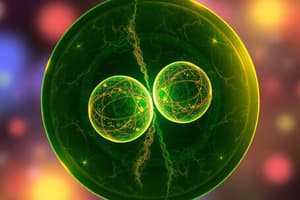Podcast
Questions and Answers
What is cell division?
What is cell division?
It's the process by which a cell divides to form two new cells.
Which of the following is a type of cell division in prokaryotes?
Which of the following is a type of cell division in prokaryotes?
- Binary fission (correct)
- Mitosis
- Cytokinesis
- Meiosis
What are the main reasons cells divide?
What are the main reasons cells divide?
- Growth
- Repair
- DNA overloading
- All of the above (correct)
What is the sequence of events in the cell cycle?
What is the sequence of events in the cell cycle?
The two main periods of the cell cycle are ___ and ___ phase.
The two main periods of the cell cycle are ___ and ___ phase.
What occurs during the S phase of interphase?
What occurs during the S phase of interphase?
What are the four stages of mitosis?
What are the four stages of mitosis?
Each new daughter cell after binary fission is genetically identical to the parent cell.
Each new daughter cell after binary fission is genetically identical to the parent cell.
What is cytokinesis?
What is cytokinesis?
The process of forming sex cells is known as ___.
The process of forming sex cells is known as ___.
Flashcards are hidden until you start studying
Study Notes
Cell Division
- A process where a cell divides to create two new cells.
- Crucial for growth, development, tissue repair, and reproduction.
- Helps in material exchange and prevents DNA overload.
Types of Cell Division
- Prokaryotes (Bacteria)
- Binary Fission: Divides into two identical cells.
- Eukaryotes
- Mitosis: Used for growth and repair.
- Meiosis: Produces sex cells or gametes.
Prokaryotic Cell Division: Binary Fission
- DNA Replication: DNA copies to form two identical chromosomes.
- Chromosome Segregation: Chromosomes move to opposite ends of the cell.
- Cytokinesis: Cytoplasm splits, resulting in two daughter cells.
- Daughter cells are genetically identical to the parent cell.
Eukaryotic Cell Division: Mitosis
- Results in two daughter cells with the same chromosome number and type as the parent.
- Steps of Mitosis:
- Prophase: Chromosomes condense and nuclear envelope breaks down.
- Metaphase: Chromosomes align at the cell's equator.
- Anaphase: Sister chromatids separate and move to poles.
- Telophase: Nuclear envelope reforms around separated chromosomes.
- Cytokinesis: Cytoplasm divides to form two new daughter cells.
The Cell Cycle
- Sequence from cell formation to cell division.
- Composed of growth, DNA replication, and preparation for division.
- Divided into two main periods:
- Interphase
- Mitotic Phase
Interphase
- A growth and DNA replication stage between divisions.
- Phases of Interphase:
- G1 Phase: Cell increases in size.
- S Phase: DNA replication occurs, forming sister chromatids.
- G2 Phase: Organelles double, cytoplasm increases, and structures needed for mitosis are prepared.
Mitotic Phase
- The stage where cell division occurs.
- Mitosis: Division of the nucleus into two genetically identical daughter nuclei.
- Involves two processes:
- Nucleus division
- Separation of cytoplasm into daughter cells.
- Divided into:
- First Mitotic Phase: Mitosis (Prophase > Metaphase > Anaphase > Telophase)
- Second Mitotic Phase: Cytokinesis.
Studying That Suits You
Use AI to generate personalized quizzes and flashcards to suit your learning preferences.





